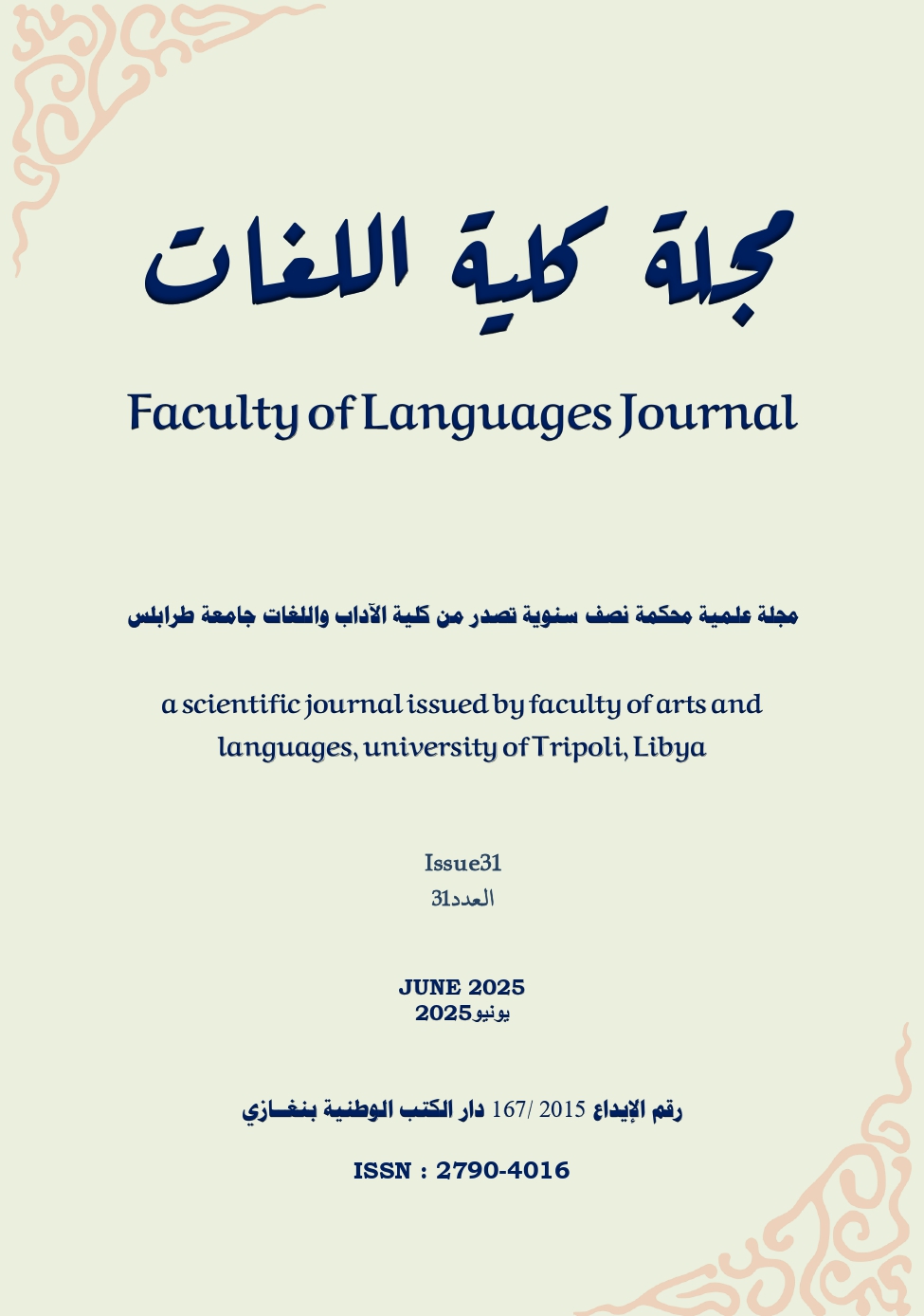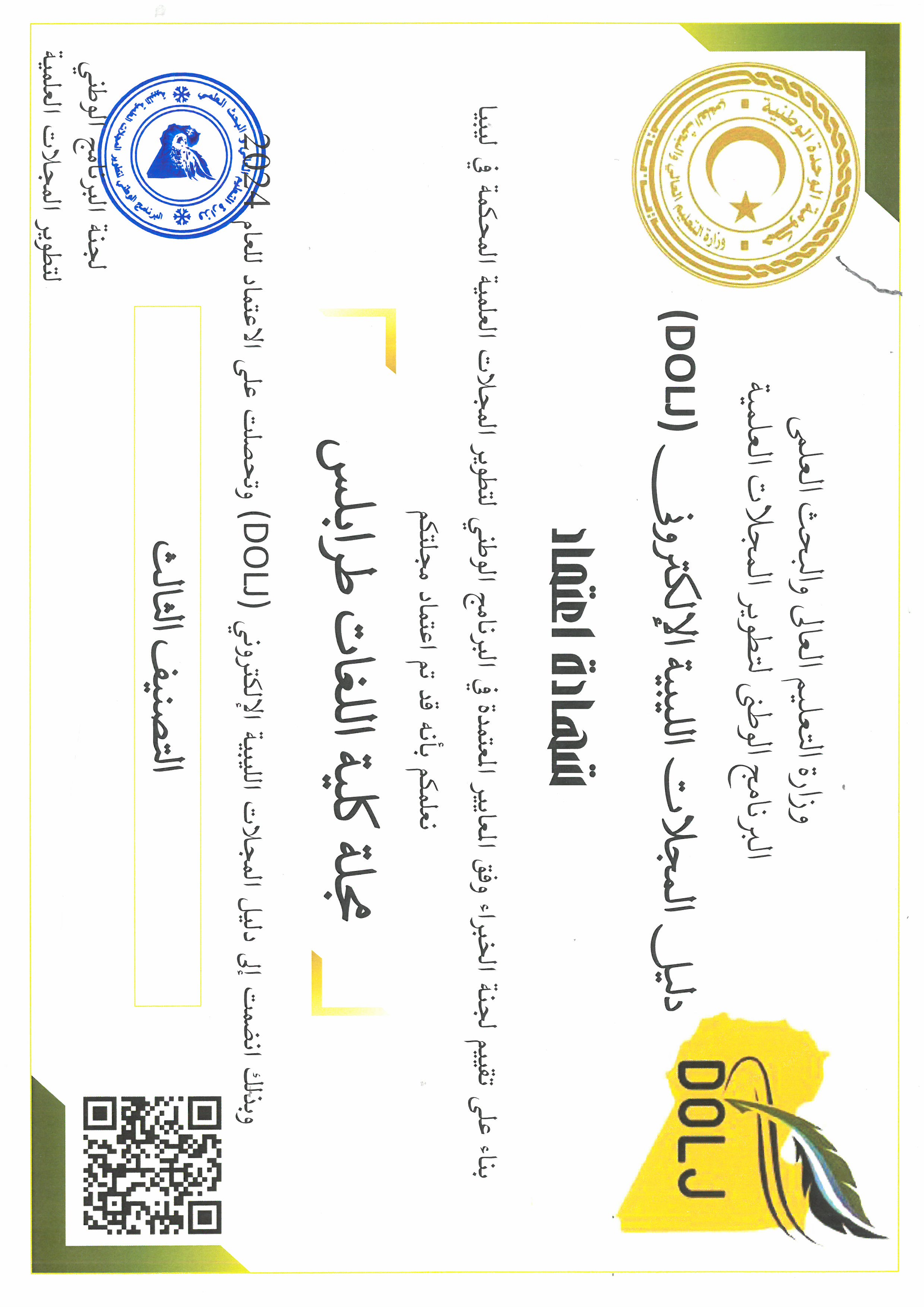Dual Implicature Analysis in Arabic Libyan Children’s Literature: A Qualitative Study Examining Conversational and Conventional Implicature Through Gricean Framework in War Narratives
الكلمات المفتاحية:
ELT, TEFL, short stories, vocabulary, teachingالملخص
تبحث هذه الدراسة النوعية في التضمين المحادثي والتقليدي في أدب الأطفال الليبي العربي، مع التركيز بشكل خاص على روايات الحرب. بالاعتماد على مبدأ غرايس التعاوني والمبادئ المرتبطة به يكشف تحليل مقتطفات من قصتين قصيرتين لمؤلفين ليبيين مشهورين موجهتين إلى الأطفال عن أنماط معقدة من بناء المعنى في النصوص التي تتناول الصراع والحرب. من خلال الفحص المنهجي لكل من معنى المتحدث والضمنيات التي يتم تشغيلها تقليديا، تحدد الدراسة استراتيجيات التواصل المميزة المستخدمة في أدب الأطفال الذي يتعامل مع الموضوعات الحساسة. توضح النتائج كيف يتنقل المؤلفون مع تحديات تقديم الموضوعات المتعلقة بالحرب للقراء الأطفال من خلال التلاعب الاستراتيجي بأنواع التضمين، وخلق معاني متعددة الطبقات. تساهم الدراسة في فهمنا لكيفية استخدام أدب الأطفال لآليات ضمنية لنقل الحقائق الاجتماعية والسياسية المعقدة، مع الحفاظ على الخطاب المناسب للعمر
المراجع
Al-Harbi, A. (2021). Trends in Modern Arabic Children's Literature: A Pragmatic Analysis. Middle Eastern Journal of Children's Literature, 8(1), 34-50.
Al-Mansour, N. (2011). The role of Arabic children's literature in the transmission of cultural values. Journal of Children's Literature Studies, 8(2), 45–60.
Al-Qahtani, M. H. (2013). The acquisition of pragmatic competence in Arabic-speaking children. Journal of Pragmatics, 55, 1-15.
Al-Qasim, R. (2021). Cultural Implicature in Arabic Children's Literature: A Case Study of Modern Storybooks. Arab World English Journal (AWEJ), 12(3), 78-92.
Al-Yaqout, G. (2015). The Evolution of Arabic Children's Literature: From Didacticism to Creativity. International Research in Children's Literature, 8(1), 1-15.
Al-Zahrani, M. (2023). Implicature in Digital Arabic Children's Literature: A New Frontier for Pragmatic Development. Digital Humanities Quarterly, 17(2), 89-104.
Brown, A. M., & Green, T. L. (2023). "The role of implicature in early literacy: How picture books teach inference-making." Early Childhood Research Quarterly, 64, 123-135. https://doi.org/10.1016/j.ecresq.2023.02.007
Brown, A., & Taylor, M. (2021). The role of implicature in moral education through children's stories. Journal of Moral Education, 50(2), 123–140. https://doi.org/10.1080/03057240.2021.1893150
Carston, R. (1991). Implicature, explicature, and truth-theoretic semantics. In Pragmatics: A Reader.
Grice, H. P. (1975). Logic and conversation. In P. Cole & J. L. Morgan (Eds.), Syntax and semantics (Vol. 3, pp. 41-58). Academic Press.
Huang, Y. (2014) Pragmatics (2nd. ed.) Oxford University Press.
Khalil, I. (2018). "Contemporary Arabic Children's Literature: Trends and Challenges." Journal of Arabic Literature, 49(3), 245-260.
Levinson, S. C. (2000). Presumptive meanings: The theory of generalized conversational implicature. MIT Press.
Smith, J., & Johnson, L. (2019). Pragmatic development and the role of implicature in children's literature. Journal of Child Language, 46(3), 567–589.https://doi.org/10.1017/S030500091800050X
Smith, J. L., & Johnson, R. K. (2022). "Understanding implicature in children's literature: A developmental perspective." Journal of Child Language, 49(4), 789-810.
Sperber, D., & Wilson, D. (1986). Relevance: Communication and cognition. Harvard University Press.
Thompson, E. R., & Davis, P. K. (2022). "Teaching morals through implicature: A pragmatic analysis of Aesop's fables. “Children’s Literature in Education, 53(2), 167-182. https://doi.org/10.1007/s10583-022-09489-6
Wilson, D., & Clark, E. V. (2022). "How children understand implicature in stories: A cognitive developmental approach." Cognitive Development, 63, 101-115.https://doi.org/10.1016/j.cogdev.2022.101234
Primary Sources
إبراهيم الكوني (1987) ."واحة كبيرة تضج بالغناء". سلسلة قصص الجهاد، مركز جهاد الليبيين للدراسات التاريخية.
Al-Koni, I (1987). "A Large Oasis Abundant with Singing." Series of Jihad Stories, Libyan Center for Historical Studies.
خليفة حسين مصطفى . (1987) "لكنه لم يعد". سلسلة قصص الجهاد، مركز جهاد الليبيين للدراسات التاريخية.
Mustafa, K. H. (1987) "But He Never Came Back." Series of Jihad Stories, Libyan Center for Historical Studies.

التنزيلات
منشور
كيفية الاقتباس
إصدار
القسم
الرخصة
الحقوق الفكرية (c) 2025 Faculty of Languages Journal-Tripoli-Libya

هذا العمل مرخص بموجب Creative Commons Attribution 4.0 International License.
 https://orcid.org/0009-0002-8251-5878
https://orcid.org/0009-0002-8251-5878




